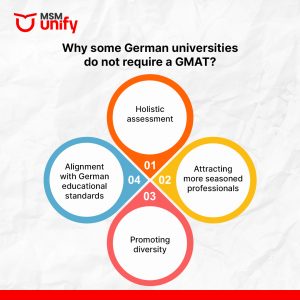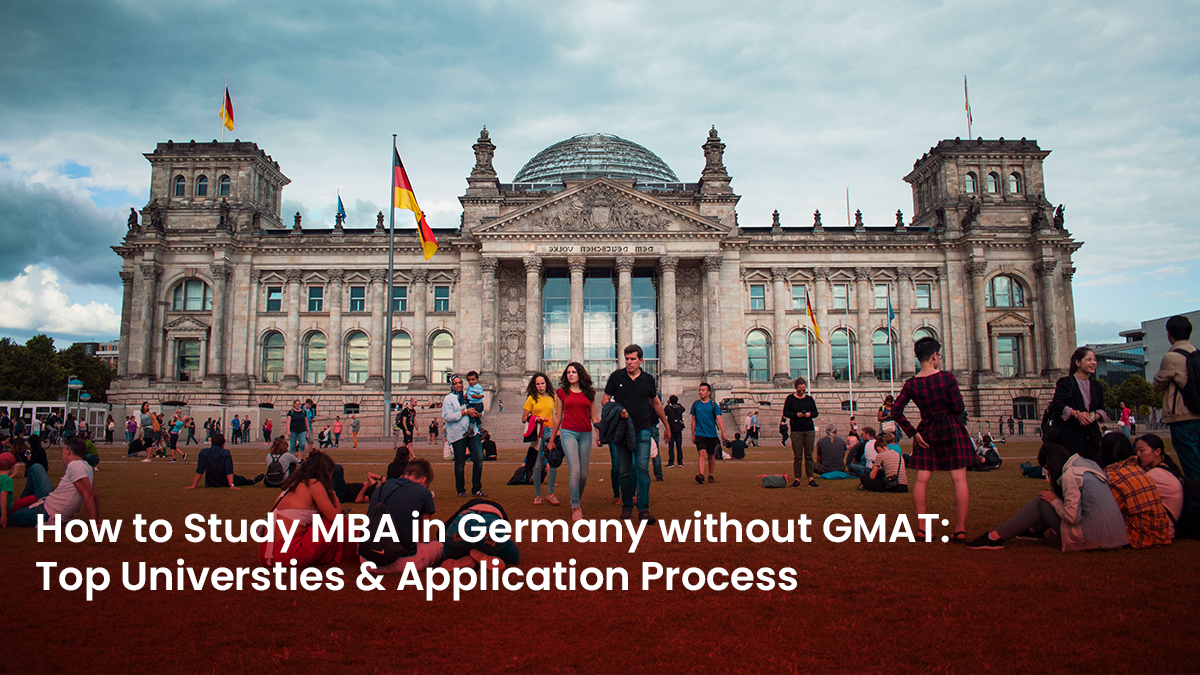Germany is becoming an increasingly popular study-abroad destination for MBA students, drawing over 440,564 international students each year, with an increasing percentage pursuing MBA programs. Notably, numerous prominent German universities do not require the GMAT for entrance, making it a viable alternative for many. For Indian students, Germany provides a unique combination of high-quality education and cost-effectiveness, with tuition fees frequently lower than in other popular study locations such as the United States or the United Kingdom.
This approach is constructive for Indian students as well as international applicants who might consider GMAT preparation difficult or irrelevant. In this article, we shall discuss the top universities to study MBA in Germany without GMAT, the application procedure, and important advice for aspiring students.
Why some German universities do not require a GMAT?
Several German universities discontinued the GMAT requirement instead of a more comprehensive assessment approach. This flexibility results from an emphasis on real-world knowledge, work experience, and academic achievement as opposed to test scores. The primary reasons behind this strategy are:
- Holistic assessment: Universities assess candidates based on their work history, scholastic achievements, and leadership potential.
- Attracting more seasoned professionals: A lot of MBA institutions prioritize candidates with a lot of work experience, which lessens the weight of the GMAT.
- Promoting diversity: By not requiring the GMAT, colleges can attract students from various backgrounds, enriching the educational experience.
- Alignment with German educational standards: Germany’s educational approach, which prepares students for the labor market, is congruent with its focus on practical expertise and real-world experience.

Best MBA colleges in Germany without GMAT
Several prestigious universities in Germany offer MBA programs without requiring the GMAT. Here are some of the top options:
| University name | Key features |
| Frankfurt School of Finance & Management | Focuses on finance and management, known for strong industry connections. |
| Technical University of Munich (TUM) | Renowned for engineering and technology management programs. |
| RWTH Aachen University | Offers a tech-centric MBA with a focus on innovation. |
| Ludwig-Maximilians-Universität München (LMU) | A broad range of MBA specializations with a focus on research. |
| University of Göttingen | Known for interdisciplinary programs and a strong research orientation. |
1-Year MBA programs in Germany without GMAT
For those looking for a shorter road to an MBA, Germany has many one-year programs that do not require the GMAT. These programs are intensive and geared towards professionals with extensive job experience. They prioritize practical skills and leadership development, putting you on the fast lane to career advancement. Below are some programs for 1-year MBA in Germany that do not require the GMAT:
- Mannheim Business School – Mannheim Full-time MBA
- EBS Business School – Full-time MBA
- European School of Management and Technology (ESMT) Berlin – Full-time MBA
- WHU – Otto Beisheim School of Management – MBA program
- HHL Leipzig Graduate School of Management – Full-time MBA
Eligibility criteria for MBA in Germany without GMAT
In order to apply for an MBA in Germany without a GMAT, candidates must normally fulfill the following requirements:
- Academic history: Holds a bachelor’s degree with a 3.0-3.5 GPA.
- Work experience: Typically, two to five years of pertinent work experience is required.
- Language proficiency: Proof of English language ability via the TOEFL or IELTS.
- Personal statement: A strong essay outlining your motivations and career aspirations.
- Recommendation letters: Strong recommendations from instructors or employers.
These requirements make sure that applicants are ready for the program’s demanding professional and academic requirements.
Application for studying MBA in Germany without GMAT
Applying for an MBA in Germany without GMAT involves several key steps:
- Research programs: Find out the MBA programs that offer the programs that best suit your career path and passion.
- Prepare documents: Collect transcripts, language proficiency test, resume, personal statement, and letters of recommendation.
- Submit applications: Use an online application through the university’s application system. Be aware of particular dates, which are different for each program.
- Interview process: Some universities might provide an interview as one of the selection criteria.
- Receive offer letter: Applicants who pass the selection will be sent an offer letter that indicates the procedures to be followed including visa processes and other issues to do with finance.

MBA in Germany for Indian students without GMAT: Key considerations
There are certain aspects that Indian students must be aware of while planning to study MBA in Germany; these include the visa process, blocked accounts for showing financial credibility, and culture shock. It is also useful to get in touch with alumni or current learners to learn more about the program and life in Germany.
Conclusion
MBA in Germany without GMAT is a perfect chance for individuals who are willing to enhance their career in an internationally acknowledged educational system. MBA aspirants can find Germany quite appealing as the best universities have loose admission requirements and emphasize professional competencies. When you prepare your application well and select an appropriate program, you are on the right track toward obtaining a degree in one of the most progressive nations in the world.












